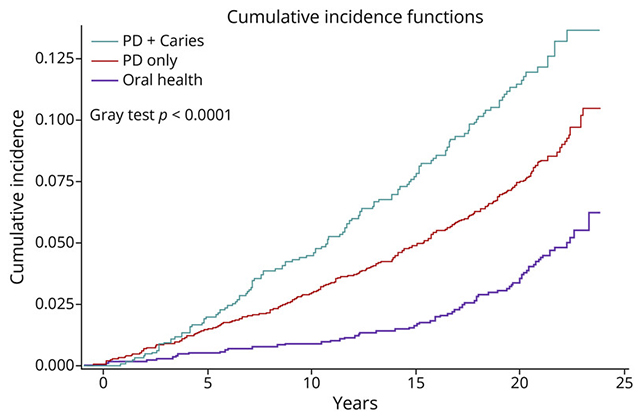Oral hygiene has been linked to multiple health conditions, including dementia and diabetes. Now, research shows that people with both gum disease and more tooth cavities also have a notably higher risk of stroke.
Both have been individually associated with stroke in the past, but few studies have analyzed the conditions in combination. So a study led by a team from the University of South Carolina restricted their investigation to individuals with cases of periodontal disease and dental caries.
"We found that people with both cavities and gum disease had almost twice the risk of stroke when compared to people with good oral health, even after controlling for cardiovascular risk factors," says Souvik Sen, the chair of the neurology department at the University of South Carolina.
Related: This Popular Diet Seems to Reduce Gum Disease, Scientists Say
The study involved 5,986 adults with an average age of 63, with no prior history of ischemic stroke (caused by clots), coronary heart disease, or cavities without a history of gum disease, whose health was tracked for an average of 21 years. Their oral health was then charted against major cardiovascular events, including ischemic stroke.

After dividing the participants into three groups based on good oral health, gum disease only, or gum disease and cavities, the researchers found just 4.1 percent of those with good oral health had experienced a stroke event in the past. Among those who just had gum disease, the figure jumped to 6.9 percent. In the gum disease and cavities group, the incidence was 10 percent.
Once common contributing factors such as body mass index and smoking status were factored in, the final calculations showed that those with gum disease had a 44 percent increased risk of stroke than those with healthy mouths. Those with both gum disease and cavities had an 86 percent increased risk.
Since the study's results only describe an association, the researchers can only speculate why the link exists. However, studies suggest that inflammation and bacteria from the mouth can spread to other areas of the body, worsening cardiovascular health and increasing the likelihood of clots.
It's an idea that's been explored in earlier studies too, which have found oral bacteria in the plaques that can build up and put pressure on the arteries – potentially leading to the formation of clots and triggering of ischemic strokes.
"These findings suggest that improving oral health may be an important part of stroke prevention efforts," says Sen.
Overall, people with both gum disease and cavities had a 36 percent higher risk of major cardiovascular events – including strokes, fatal heart disease, or fatal heart attacks – than those classed as having healthy mouths.
Related: Common Sweetener Could Damage Critical Brain Barrier, Risking Stroke
The results also confirm the benefits of routine checkups: those who reported visiting the dentist regularly were 81 percent less likely to have both gum disease and cavities together, and 29 percent less likely to have gum disease.
"This study reinforces the idea that taking care of your teeth and gums isn't just about your smile," says Sen. "It could help protect your brain."
"People with signs of gum disease or cavities should seek treatment not just to preserve their teeth, but potentially to reduce stroke risk."
The research has been published in Neurology Open Access.

